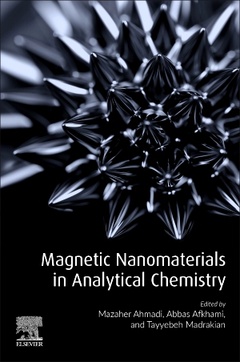Magnetic Nanomaterials in Analytical Chemistry
Coordonnateurs : Ahmadi Mazaher, Afkhami Abbas, Madrakian Tayyebeh

Magnetic Nanomaterials in Analytical Chemistry provides the first comprehensive review of magnetic nanomaterials in a variety of analytical chemistry applications, including basic information necessary for students and those new to the topic to utilize them. In addition to analytical chemists, those in various other disciplines where these materials have great potential?e.g., organic chemistry, catalysis, sensors?will also find this a valuable resource. Magnetic nanomaterials that can be controlled using external magnetic fields have opened new doors for the development of new sample preparation methods and novel magnetic sorbents for forensic chemistry, environmental monitoring, magnetic digital microfluidics, bioanalysis, and food analysis.
In addition, they are seeing wide application as sensing materials in the development of giant magnetoresistive sensors, biosensors, electrochemical sensors, surface-enhanced Raman spectroscopy sensors, resonance light scattering sensors, and colorimetric sensors.
Section 1: Fundamentals 1. Classification, synthesis, and functionalization of magnetic nanomaterials 2. Separation and isolation of magnetic nanomaterials 3. Characterization of magnetic nanomaterials 4. Toxicity, fate, and safe disposal of magnetic nanomaterials
Section 2: Application of magnetic nanomaterials as sorbents 5. Application of magnetic nanomaterials in food analysis 6. Application of magnetic nanomaterials in bioanalysis 7. Application of magnetic nanomaterials in environmental monitoring 8. Application of magnetic nanomaterials in forensic chemistry 9. Application of magnetic nanomaterials in magnetic digital microfluidics
Section 3: Application of magnetic nanomaterials as sensors 10. Application of magnetic nanomaterials as colorimetric sensors 11. Application of magnetic nanomaterials as resonance light scattering sensors 12. Application of magnetic nanomaterials as surface-enhanced Raman spectroscopy sensors 13. Application of magnetic nanomaterials as electrochemical sensors 14. Application of magnetic nanomaterials as biosensors 15. Application of magnetic nanomaterials as giant magnetoresistive sensors
Prof. Abbas Afkhami is a Full Professor of Analytical Chemistry since 2001. He has published more than 310 scientific articles in reputed international journals and two edited Elsevier books in different fields. His research is mainly focused on the development of electrochemical sensors and biosensors. Afkhami has received several awards and honors including the international scientist by ISI (ESI) since 2011, the award of the organization of the Islamic countries (COMSTECH Award), 2009, distinguished professor of the I. R. Iran Universities, 2012, distinguished Analytical chemist of Iran, selected by the Iranian Chemical Society, 2010, and distinguished researcher of Bu-Ali Sina University, selected by the Iranian Ministry of Science, Research and Technology, 2004. He serves as the Editor-in-Chief in Analytical and Bioanalytical Chemistry Research, the editorial board of Green and Sustainable Chemistry, and the board of directors of the Iranian Chemical Society. He also acts as a reviewer in many journals.
Prof. Tayyebeh Madrakian is a Full Professor of Analytical Chemistry since 2011. Her research interests comprise separation techniques, including the developing of new approaches and synthesis of novel nanomaterials. She
- Includes fundamental information on magnetic nanomaterials, including their classification, synthesis, functionalization, and characterization methods, separation and isolation techniques, toxicity, fate, and safe disposal
- Each chapter describes a specific application
- Utilizes figures, schemes, and images for better understanding of the principles of the method
- Presents information on advanced methods, such as giant magnetoresistive and magnetic digital microfluidics
Date de parution : 04-2021
Ouvrage de 368 p.
15x22.8 cm
Thème de Magnetic Nanomaterials in Analytical Chemistry :
Mots-clés :
?Advanced nanosorbents; Analytical chemistry; Anticounterfeiting; Application; Applications of MNPs; Aptasensor; Aptasensors; Bioanalysis; Biological samples; Biological species; Cancer therapy; Characterization of chemical and structural properties; Characterization of magnetic properties; Characterization of size and morphology; Characterization of surface properties; Characterization techniques; Classification; Clinical diagnosis; Colorimetric detection; Colorimetric sensors; Determination; Ecosystem; Electrochemical DNA biosensor; Electrochemical biosensor; Electrochemical sensors; Environmental analysis; Environmental pollutants; Environmental pollution control; Enzymatic biosensor; Explosives; Field-flow fractionation; Fingerprints; Fluxgate sensor; Food analysis; Food quality; Food safety; Forensic chemistry; Functionalization; Hall sensor; Homeland security; Illicit drugs; Immunosensor; Localized surface plasmon resonance; Magnetic field sensors; Magnetic nanomaterial; Magnetic nanomaterials; Magnetic nanoparticle biosafety; Magnetic nanoparticle cytotoxicity; Magnetic nanoparticles; Magnetic nanoparticles and light scattering; Magnetic separation techniques; Magnetic solid-phase extraction; Magnetoresistive sensors; Microfluidic methods; Omics analysis; Pharmaceutical compounds analysis; Plasma; Plasmonic sensors; Properties; Reactive oxygen species; Removal; Resonance light scattering; SQUID sensors; Sensing; Separation; Surface plasmon resonance; Surface-enhanced Raman scattering; Urine



